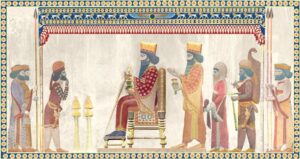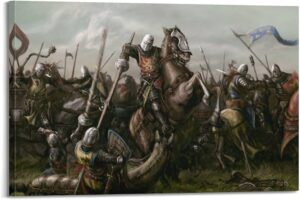They told me that a king once ordered the killing of a prisoner. In that hopeless moment, the prisoner began to insult the king and say ugly words, as they have been said: “When a person loses hope of life, he says whatever is in his heart.”
In a time of distress, when there is no way to escape,
even the desperate one will grab the sharp edge of a sword.
When a human loses hope, his tongue grows long
like a defeated cat that dares to attack a dog.
The king asked, “What is he saying?”, one of the ministers, who was kind in nature, replied: “O my King, he says: {wal-kāẓimīna al-ghayẓa wa al-ʿāfīna ʿani al-nās}-Those who control their anger and forgive others.’”, the heart of the king softened, and he forgave the prisoner’s life. Then, another minister (who was the opposite of the first) said: “It is not right, when we are all from one kind, to lie in front of kings.
The man insulted the king and spoke badly of him.”, The king frowned at these words and said: “The lie of that good-hearted minister is dearer to me than your truth, because his lie came from kindness, but your truth was born from malice.”, as the wise have said: “A lie that brings benefit is better than a truth that causes trouble.”
When the king treats someone with kindness,
it is shameful for a person to speak anything but good in his presence.
And on the collar of the palace of Farīdūn (the arch of his palace) it was written:
O brother, this world does not remain for anyone
Tie your heart only to the Creator, and be content.
Do not lean on the kingdom of the world, nor take it as your support
For that one has raised many like you — and then trap them beneath
When the pure soul becomes joyful at its departure (when the time of death arrives),
there is no difference for the body, whether it dies on the throne or on the dust.
أخبروني أن ملِكاً أشار بقتل أسيرٍ، فبدأ الأسير في تلك الحالة اليائسة يَسبُّ الملِكَ ويقول كلاماً قبيحاً، وكما قالوا: مَنْ يَئس من الحياةِ قال ما في قلبهِ.
في وقت الإضطرار، إذا لم يبقَ بِداً من الفرار
فسيمسك اليائس بطرف السيف الحادِّ
إِذا یَئِسَ الْإِنسانُ طالَ لِسانُهُ
کَسِنَّورٍ مَغْلُوبٍ یَصُولُ عَلَی الْکلبِ
سأل الملِك: «ماذا يقول؟»، فقال أحد الوزراء، وكان طَيب المَحّضر، يا مولاي، هو يقول: {وَالْكَاظِمِينَ الْغَيْظَ وَالْعَافِينَ عَنِ النَّاسِ}، فرَقَّ قلب الملِك وعفى عن هدر دمه. فقال وزيرٌ آخر (بالضد من الوزير الأول): «لا ينبغي لنا ونحن أبناء جنس واحدٍ، أن نُكذب في حضرة الملوك؛ فلقد سَبَّ (الملك) وشتمه»، فعبس الملِك من هذا الكلام، وقال: «كَذبُه (الوزير طيب المحضر/طيب القلب) أحبُّ إليَّ من صدقك (الوزير الأخر)، لأن كَذبَه قَصدَ فيه مَصلحةٍ ولكن حَديثُكَ (الصادق) بُني على خُبثٍ»، حيث قال الحكماء: «كذبةٌ تجلب مَصلحةً، خيرٌ من صدقٍ مُثيرٍ للفتنةِ».
مَنْ يُحسن إليه المَلِكُ، عندما يتحدث
عيبٌ عليه، أن يقول بحضرة الملك، غير الخيرَ
وعلى طاق إيوان فريدون مكتوب:
يا أخي الدنيا لا تبقى لأحد
اربط قلبك بالخالق وحده، وأكفِ نفسكَ
لا تجعل لك متكأ من مُلك الدنيا، وظهيراً لك
فقد ربَّى كثيراً مِن مثلك، ثم قضى عليهم
إذا أطربت الروح الطاهرة على الرحيل (جاءت ساعة الموت)
فلا فرق للجسد بين الموت على العرش، أو على التراب
پادشاهی را شنیدم به کُشتنِ اسیری اشارت کرد. بیچاره در آن حالتِ نومیدی مَلِک را دشنام دادن گرفت و سَقَط گفتن، که گفتهاند: هر که دست از جان بشوید، هر چه در دل دارد بگوید.
وقتِ ضرورت چو نَمانَد گریز
دست بگیرَد سَرِ شَمشیرِ تیز
إِذا یَئِسَ الْإِنسانُ طالَ لِسانُهُ
کَسِنَّورٍ مَغْلُوبٍ یَصُولُ عَلَی الْکلبِ
مَلِک پرسید: «چه میگوید؟» یکی از وزرایِ نیکمَحضر گفت: «ای خداوند! همی گوید: وَ الْکاظِمِینَ الغَیْظَ وَ الْعافِینَ عَنِ النّاسِ». مَلِک را رحمت آمد و از سَرِ خونِ او درگذشت. وزیرِ دیگر که ضدّ او بود گفت: «ابنای جنسِ ما را نشاید در حضرتِ پادشاهان جز به راستی سخن گفتن. این مَلِک را دشنام داد و ناسزا گفت». مَلِک روی از این سخن در هم آورد و گفت: «آن دروغِ وی پسندیدهتر آمد مَرا زین راست که تو گفتی، که رویِ آن در مصلحتی بود و بنایِ این بر خُبْثی». و خردمندان گفتهاند: «دروغی مصلحتآمیز بِهْ که راستی فتنهانگیز».
هر که شاه آن کُنَد که او گوید
حیف باشد که جز نِکو گوید
بَر طاقِ ایوانِ فریدون نِبِشته بود:
جَهان اِی بَرادَر نَمانَد به کَس
دِل اَندَر جَهانآفرین بَند و بَس
مَکن تکیه بَر مُلْکِ دنیا و پُشت
که بسیار کَس چون تو پَروَرْد و کُشت
چو آهنگِ رَفتن کُنَد جانِ پاک
چه بَر تَخت مُردنْ، چه بَر رویِ خاک




